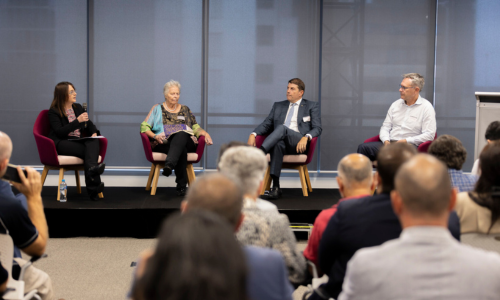How can we finance the transition to net zero?
The green energy transition event on 15 February was a forum for ideas, with key insights revealing optimistic potential paths for Australia’s future.

At Macquarie Business School’s ‘Financing the Green Energy Transition’ networking event on 15 February, expert panellists, Dr Kerry Schott AO, Chair of the Carbon Market Institute; Martijn Wilder AM, Founder and CEO of Pollination; and Dr Guy Debelle, Non-Executive Director at Tivan, shared their greatest fears regarding Australia’s green energy transition.
The panel agreed that reaching an average global temperature increase of 1.5 degrees Celsius (the climate threshold), biodiversity loss and slow climate action are among the top concerns. They also shared what makes them optimistic for Australia’s future: South Australia’s renewable example and a focus on sustainable finance in our path to net zero.
The discussion, moderated by Deputy Dean of Research and Innovation, Professor Leonie Tickle, navigated the complexities of this important topic and built on the school’s recent Treasury submission on Sustainable Finance in partnership with Cyan Ventures.
Commenting on our current status, Dr Schott said: “In terms of the energy transition, it’s very patchy. We’re actually making a lot of progress in some areas. But it's not in all areas and not fast enough.”
This set the scene for an open discussion about Australia’s progress and future trajectory, with the speakers discussing barriers and solutions to the way forward.
The panel spoke about the need in Australia to harness our clean energy resources and use them to our competitive advantage, and agreed that if we get this right, we can have a major impact through our own domestic decarbonisation and as a green energy exporter.
“Australia has the best sun and the best wind, and in a number of places those two things are in the same place, which is fantastic,” Dr Debelle said. “That's something that we have that the Japanese, for instance, don't have or the Koreans don't have.
“The other thing that is often overlooked is that we have land to deploy the necessary technology for a smooth energy transition.”
Dr Schott highlighted the importance of harnessing rooftop solar and improving access to battery storage. Providing additional government support to make batteries more affordable, using EVs as batteries on wheels if they have input and output, and learning lessons from others will help get us to where we need to be.
“At the moment, about 3.7 million houses and businesses in Australia have rooftop solar – 20 per cent of installed capacity – which is absolutely phenomenal. It's grown very rapidly in the last five years, but we could do much more with decentralised battery storage to optimise across households,” said Dr Schott.
The panel discussed in detail ideas for financing the green transition, aligning on the need for investment across the value chain, large-scale government support and support from other entities such as superannuation funds and businesses.
“My view is that in this energy transition, you can’t take an isolated investment approach," said Mr Wilder. “You actually take an investment approach across the whole ecosystem and you try to work out in the value chain, which parts can Australia do and how can we then use that to build an export industry and go overseas.”
While ending with questions from the audience, the panel shared their optimism for the future. They discussed the role of a formal sustainable finance taxonomy (a standard definition of what sustainable finance means across the industry that could help curb greenwashing), green hydrogen, examples from South Australia – a state that generates almost 70 per cent of its electricity from renewable sources – and research and development driven by universities.
Professor Tickle said: “At Macquarie Business School, we believe in fostering dialogue between industry, alumni, students and researchers to help solve society’s biggest problems. This superb event with three leading thinkers provided powerful insights into one of the world’s most critical challenges.”
About the event series
This series of exclusive events will run throughout the year, with a focus on being a forum for ideas and networking for current postgraduate students, alumni and industry professionals. Each event spotlights an important business topic with commentary from high-calibre guest speakers and Macquarie Business School academics. We look forward to the next event in April.